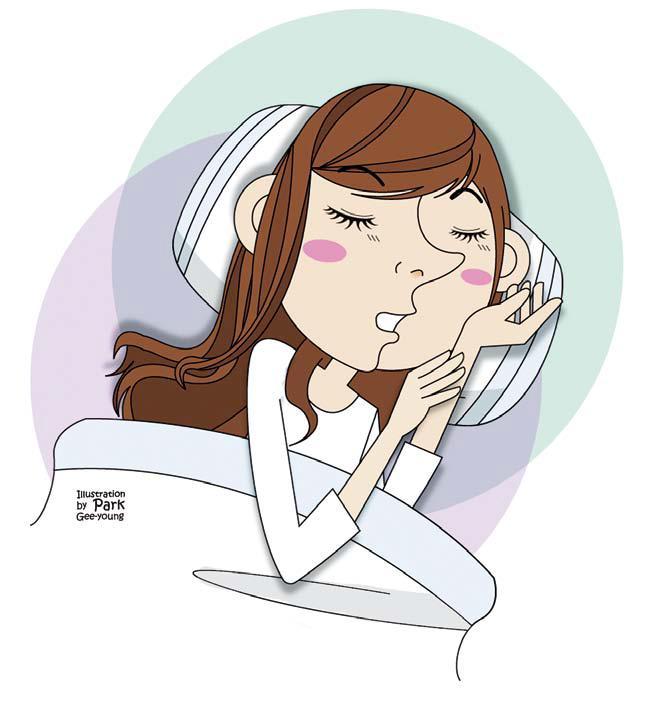We find it hard to fall asleep when we travel to the United States or Europe, waking up often during the night. This leads to fatigue during the day, drowsiness, decreased appetite and concentration.
Such symptoms are referred to as “jet lag,” and are caused by the biological clock in the hypothalamus of the brain. The biological clock set in Korea does not quickly adjust to the time zone in another country. It usually takes one day to adjust for one hour of time difference. For example, in order to overcome a time difference of five hours, five days are needed.

Therefore, a person with a biological clock set in Korea will feel fatigue, drowsiness and decreased concentration during the daytime in the United States, because the person’s brain and body is currently at nighttime. However, within a few days, the body adjusts to the new environment and the biological clock resets.
The best way to overcome jet lag is to reduce this readjustment period. In order to quickly readjust the biological clock, it is important to expose yourself to as much sunlight as possible and be active. Sunlight is one of the main factors that affects the biological clock. When the sun rises, the eyes recognize the sunlight and deliver this to the biological clock. The biological clock, which has been activated by the sunlight, sends a signal to the pineal gland to rapidly decrease the production of melatonin, a sleep hormone.
When sunlight reaches the biological clock, the biological clock increases the alertness of the brain and awakens the body. This is why people who sleep late and wake up late in the morning suffer from sleep deprivation, as they cannot sleep deeply after the sun rises.
People who work at multiple-shift jobs have to work during the nighttime when they are on night duty, and sleep during the day. A person who works during the day and then starts night shift will work during the night time when the body should be resting, and sleep during the daytime when the body should be active, leading to various problems. This is called “shift-work sleep disorder” or “circadian rhythm sleep disorder.” The symptoms include sleeping during work hours, concentration problems, headache, systemic fatigue, difficulty falling asleep during days off, irritability and a bad mood.
When circadian rhythm sleep disorder continues, the shift-workers will develop higher risks of hypertension, cardiovascular disease, weight changes, gastrointestinal disease (dyspepsia, gastric ulcers etc.), amnesia, become prone to colds, and menstrual irregularity. This leads to decreased work productivity, decreased ability to rapidly make decisions, and increased risk of work accidents or traffic accidents. The accident in Chernobyl Nuclear Plant was also related to shift work.
One of the major difficulties all shift-workers experience is drowsiness during driving. According to the results of a sleep research institute in Australia, driving after not sleeping for 17 hours is the equivalent to driving with a blood alcohol level of 0.05, while driving without 24 hours of sleep is equivalent to driving with a blood alcohol level of 0.1. A report from the United States showed that 60-70 percent of night-shift workers suffered from circadian rhythm sleep disorder.
Thus, in order to work at night smoothly, it is best to adjust the biological clock at least three days before starting night-shift work to set the circadian rhythm to the night shift. This is done by moving back the time you go to bed by 2-3 hours in a step-wise manner. It is also beneficial to expose yourself to bright light at night. Exposure to bright light inhibits the production of melatonin and helps move the biological clock backwards.
Melatonin increases in concentration after sundown during the evenings, and its concentration reaches 10-50 fold of the daytime level during the night. After early morning sunrises, the levels rapidly decrease. Melatonin helps us sleep, and is also important as it affects the circadian rhythm. It adjusts the circadian rhythm in an opposite manner to sunlight. For example, exposure to bright light in the late evening hours is equivalent to exposure to sunlight, pushing the sleep hours in the early morning. Consuming melatonin at the same hour moves the sleepy hour earlier.
Using the theoretical background of sunlight and melatonin can help adjust the circadian rhythm more quickly. A night-shift worker comes back home in the morning, during which time he or she must sleep. However, the sunlight and the noise around the household interfere with deep sleep. Sunlight is a strong inhibitor of melatonin production, making it difficult to sleep. Therefore, it is helpful to block the sunlight completely using thick curtains after returning from night-shift work, and sleeping in a quiet place or using ear plugs to block out the noise.
It is also necessary to sleep and wake up at the same time during the night-shift period. You should sleep before going to the next shift work, just like you would sleep during the night and go to work in the morning. Until the circadian rhythm is completely set, it is best to sleep for longer hours.
When going out during the daytime, it is also helpful to use sunglasses to block bright light. Using bright lighting in the office or workplace during the night, just like during the day, will help your work and help you cope with sleep disorder. This will help the circadian rhythm adjust to night-shift work. Waking up frequently during sleep or having an irregular lifestyle will lead to disruption of the circadian rhythm, making your family life and night work difficult.
The employer should understand the difficulties of shift workers and make efforts to minimize such difficulties. For example, the employer should avoid rapid transition between day and night shifts, and it is best to move the shifts in a clockwise manner (for example, from day shift to evening shift, or from the evening shift to night shift). Also, the employee should be given a few days of rest to adjust their circadian rhythm before starting night shift.
The following are some principles to be aware of when sleeping during the day after a night shift.
1. Sleep for sufficient hours.
2. Sleep at the same time of the day.
3. Avoid sunlight, phone calls or other factors that interrupt sleep.
4. Warn others not to disturb you during your day sleep.
5.Maintain a cool and quiet bedroom atmosphere.
6.Avoid coffee, sleep inducers, alcohol or cigarettes before sleeping.
7. If your home environment is noisy, use soft ear plugs or noise-blocking curtains and carpet. You can also try white noise to block out external noise.
8. It is better to sleep before you start the night shift, in the afternoon and evening, rather than sleeping in the morning after finishing work. If this is not possible, try sleeping for a short period before starting the night shift.
 |
Hong Seung-bong |
By Hong Seung-bong
The author is a doctor at the Department of Neurology of Samsung Medical Center and a professor of Sungkyunkwan University School of Medicine. ―Ed.







![[Herald Interview] 'Trump will use tariffs as first line of defense for American manufacturing'](http://res.heraldm.com/phpwas/restmb_idxmake.php?idx=644&simg=/content/image/2024/11/26/20241126050017_0.jpg)
![[Exclusive] Hyundai Mobis eyes closer ties with BYD](http://res.heraldm.com/phpwas/restmb_idxmake.php?idx=644&simg=/content/image/2024/11/25/20241125050044_0.jpg)
